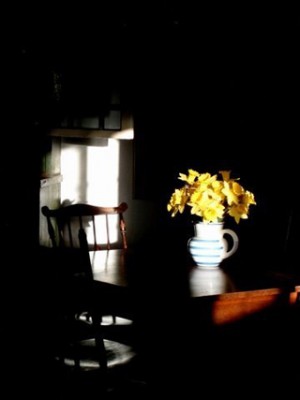 Nearly a year ago, my grandfather passed away. He was exactly a week shy of 88, so it was not really a surprise, but it was still a very sad occasion. He lived in Michigan, and my mom flew there that very afternoon, with me, my dad and my sister following the next day. It was very strange for me, since I had never lost a close family member before, but it was also difficult because I had to watch my mom suffer. Her mother had died when she was only 16, so losing her father now, too, made her especially sad.
Nearly a year ago, my grandfather passed away. He was exactly a week shy of 88, so it was not really a surprise, but it was still a very sad occasion. He lived in Michigan, and my mom flew there that very afternoon, with me, my dad and my sister following the next day. It was very strange for me, since I had never lost a close family member before, but it was also difficult because I had to watch my mom suffer. Her mother had died when she was only 16, so losing her father now, too, made her especially sad.
When we arrived in Detroit, there were a lot of things to do. Some of them were less enjoyable, like planning all of the details of the funeral itself, which my step-grandmother had asked my mom and her brothers to handle. There were also a lot of other tasks that were very enlightening to me, like looking through my grandfather's old pictures. The pictures were often accompanied by stories told by my mom and uncles. These stories showed me a new side of my grandfather, one that I had never really thought about before.
My grandfather had been 74 when I was born, so to me he had always been an old man, albeit a very funny and smart one. But listening to all of the stories about him, like when he gave his neighbors a cabbage plant saying it would blossom into beautiful flowers right before he moved to a different town, made me realize that there was an aspect of him that I had missed.
My grandfather was very religious, but I never spoke with him about faith. This was probably because our ideology clashed completely, since he was a devout Catholic and I was an extremely liberal Jew. But sometimes I wish that I could have spoken to him about it. His faith was another thing I got a new perspective on after hearing stories about him, because my family hardly mentioned it. To me, he had always seemed very religious because I had to go to church whenever I visited him, but in his children's eyes, religion was not a big part of who he was. I suppose this is because being Catholic was not a difference between him and them like it was between him and me.
All of these new perspectives of my grandfather came together for me at his funeral. The religious aspect of it did not mean a lot to me, being of a different faith. But when the eulogies were made I felt differently. I was filled with a sense of my grandfather's personality and character, and he began to seem very big to me. I thought about how alive he had been, even the last time I saw him at the age of 87, and how alive he must have been 50 years before. He was a man who had lived through a lot of hardships, particularly with his wife's sustained illness and ultimate death. However, after enduring all of that he was able to live life to the fullest and even get remarried. As the enormity of that kind of vivacity overwhelmed me, I looked up and saw the container that held my grandfather's ashes. I suddenly felt that that kind of big personality could never, ever, be contained in such a small little box. I knew at that moment that whatever it was that made him unique was not in the box, it was somewhere else. For the first time during the whole service, I began to cry.
In the year since my grandfather's death, my views on faith and religion have changed a lot. I was raised a Reform Jew, and did a lot of the things that Reform Jews do: I went to religious school once or twice a week from first through seventh grade, became a Bat Mitzvah, attended services on the High Holy Days, went to my grandmother's Passover Seder every year, and I even went to Israel.
However, after much inward debate I have decided to give up Judaism and become agnostic. While I do not believe that a person's soul travels to any sort of afterlife and am not even sure that human beings even have a soul, the emotion I felt at my grandfather's funeral still intrigues me. I do not want to give the impression that I had some sort of spiritual or divine realization that day; in fact that is very far from the truth. My dad suggested that the feeling was derived from my religion, but that does not feel right to me. Perhaps we should not take seriously any sudden and impulsive feeling we have at a funeral. Nevertheless, when I recall the passionate emotion I felt, though slightly less powerful with time, the certainty of that moment is off-putting. All I do know is, while I will never know what determines a person's personality and vitality -- whether it be chemicals in the brain, God, or something entirely different -- it is the most powerful and important part of a human being.
When Susan Yassky wrote this she was 14 years old. She enjoys playing tennis, writing fiction and contemplating the greats.
Originally published in the Change and Loss issue of KidSpirit Magazine. Photograph by Merrell Hatton.
